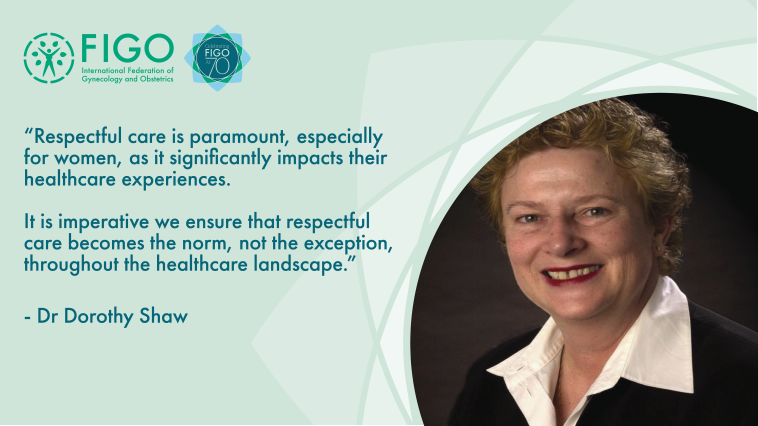A legacy of leadership and advocacy: Dr Dorothy Shaw's vision for achieving respectful care for women globally

Dr Dorothy Shaw was the first female President of FIGO (2006-2009). She is a Professor Emeritus at the University of British Columbia's Department of Obstetrics and Gynaecology and has dedicated her career to social and reproductive justice.
Specialising in high-risk pregnancy, prenatal diagnosis and medical genetics, Dr Shaw has held numerous leadership roles, significantly advancing women's health globally. In this interview, she discusses her journey with FIGO, the challenges in women's healthcare and her hopes for the future.
What led you to volunteer for FIGO initially?
I was invited to participate in a panel of women in our specialty at one of the FIGO congresses. At that time, women in leadership roles within our field were few and far between, making this an important opportunity. Following the panel, I was also asked to join a working group on violence against women, a topic I had been actively addressing during my tenure as President of the Society of Obstetricians and Gynaecologists of Canada. Subsequently, Professor Mahmoud Fathalla asked me to co-chair a study group on Women’s Sexual and Reproductive Rights with him. The first meeting of the group was probably the most inspiring time in my career.
You were elected as the first female President of FIGO, what did this achievement mean to you?
For me, it was an opportunity to adopt a more collaborative approach with our member associations and truly understand what they needed most from FIGO. It also meant the opportunity to collaborate more broadly to achieve greater impact.
What are your fondest memories from your presidency?
I have many fond memories, including how many colleagues were supportive, both women and men, as well as great collaboration with midwives through ICM. Before my presidency, a significant milestone was World Health Day when the partnership for Maternal, Newborn, and Child Health was created. Another cherished memory is the lead-up to the 'Prevention of unsafe abortion' initiative. We sent an email to all 116 FIGO member societies, recognising that expressions of interest from emails was usually very poor at the time. Remarkably, over 50 associations responded within three months, highlighting the critical need for this initiative. For me, this memory really tells the story of important issues that don't reach the surface without support.
What FIGO achievement are you most proud of?
There were several initiatives that I feel very proud of including the 'Prevention of Unsafe Abortion and its Complications.' Beginning in 2007, with Professor Anibal Faundes as the Director, the initiative, was country-led and regionally based, making its impact even more significant. It was inspiring to see the growing willingness to participate and the gradual changes, not only in the 46 countries involved but also through the south-to-south sharing that occurred, given that all participating countries were in the Global South. This collaborative effort demonstrated the profound need for such initiatives.
In your opinion, what are the biggest challenges to overcome in our journey to improve the health and rights of women girls and newborns worldwide?
There's always a great deal of interest in high-tech developments at FIGO congresses and elsewhere and these are important. Yet, when you look at what the fundamental needs are of women worldwide, there are still major gaps, including access to effective contraception, safe abortion, maternity care and emergency obstetric care. Providing essential care for women is a key cornerstone for building a functional health system. Major causes of maternal mortality like haemorrhage and pre-eclampsia are difficult to address without an effective health system. The challenges are political will and adequate numbers of appropriately trained health personnel, with a functioning referral and transport system, affordable for women and their families.
Additionally, we haven't yet achieved respectful care for women globally. Many women are still told what will happen to them instead of being given decision-making power regarding their health. This remains the biggest challenge: changing the dynamic so that women can make informed decisions about their health, especially in non-life-threatening situations.
What would you like to see from FIGO in the next 30 years?
As above, respectful care is paramount, especially for women, as it significantly impacts their healthcare experiences. When women are treated with respect, they are more likely to return for necessary visits and better understand their health situations. This approach empowers them, granting a sense of control and agency over their lives, which is often lacking in other aspects where external influences dominate. It is imperative we ensure that respectful care becomes the norm, not the exception, throughout the healthcare landscape.
Pregnancy is a marker for significant disease later in life and collaboration with colleagues in other specialties and family practice, as well as advocacy with governments is an important opportunity. In addition, mental health requires more attention, both during reproductive years and beyond. It is a major cause of maternal mortality, especially in high-income countries. FIGO could potentially collaborate based on in-country resources and global expertise to make and implement recommendations.